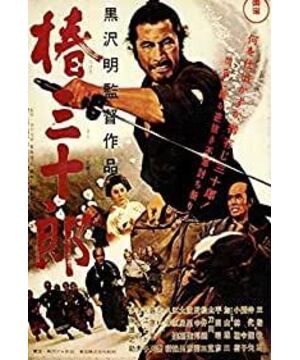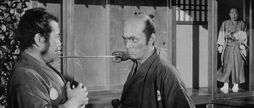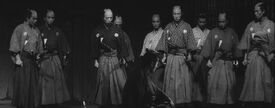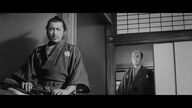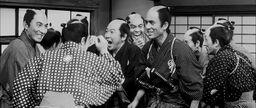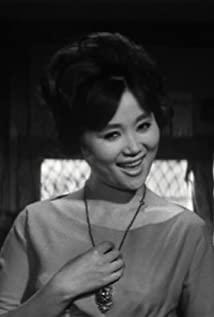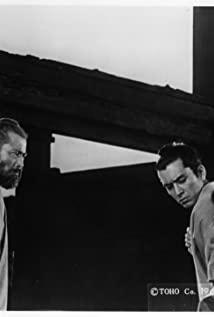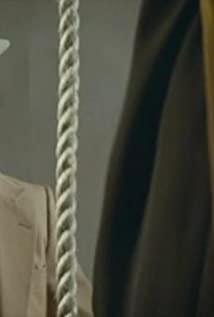I roughly watched six or seven films by Akira Kurosawa, and this one is definitely my favorite. The shots are superb, the plot is one-by-one, and there are some plot settings that even make me amazing today. But what I like most is the thoughts of Lao Tzu reflected in the characters in the movie, so I will try to use Lao Tzu's "Tao De Jing" to interpret the movie.
Family elder: Inaction
"My uncle and I couldn't agree at all. After showing him our opinion on rape, he said: I knew this for a long time, and I knew it if you didn't tell me." "Then why didn't he do anything!" He smiled and said: I may be the leader of these corrupt officials." People who have watched this movie must have some doubts. Why did the elders turn a blind eye to these wicked men and let them act recklessly, even after his nephew first proposed the suppression of rape. Still doing nothing, so that he was arrested later, triggering various incidents later, is this really just forcibly reducing his wisdom to advance the plot? I think that as a master movie, the old man’s behavior is by no means a simple reduction of his intelligence. The old man also showed his wisdom in the back of the film. Therefore, I found the answer to his behavior in the "Tao De Jing".
The background of the times in the movie is a chaotic world, we can find some signs in the movie-1. The moral order is broken, the following crimes, and the struggle between people for rights are shown in the movie. Kikui took the family elder away for his own selfish desire, and his subordinates followed him only because he felt that Kikui was inadequate and wanted to replace him in time. Such troubled times can't help but remind people of the era of collapse that Lao Tzu lived in. 2. There are continuous small-scale conflicts, and many conflicts result in deaths. 3. Tsubaki Saniro appears in the film as a ronin, and his martial arts is strong, but he has repeatedly said that he can't eat enough. Others don't think it is strange, but are accustomed to it. , I think this shows from the side that the era at that time was a troubled world where wandering warriors appeared frequently and food was a problem.
The world is not benevolent, and everything is a dog; the saint is not benevolent, and the people are the dog... ——The fifth chapter of the "Tao De Jing" Taoists who are not benevolent in heaven and earth maintain the middle, which is essentially the way of emptiness and tranquility, the way of doing nothing, doing nothing without doing anything. The saint should be as natural as heaven and earth, without human kindness and preference
Not advocating for the good, so that the people will not fight... Do nothing, there will be no rule-"The Tao Te Ching" Chapter 3 The Governance of Saints Lao Tzu is in a troubled time. The day when the nations dominate the world, and in this era of great social change, reflectors are needed. Heavy taxes, frequent wars, fewer farmers and more knife-holders, people seem to be trying their best to make a difference in this era of collapse, but in fact they can only add trouble to the people and the rule. That's why Lao Tzu put forward his specific political propositions. Inaction, obedience to nature and human nature.
Therefore, we can see that the elder did nothing when the traitor turned out to be counterproductive. It was because he obeyed human nature, and the saint should have no preference. Therefore, he was just taken away calmly, inaction, and guarding his own emptiness. Is this a stupid practice? Many people may think this is the case, but if you think about it, even if you first collect evidence and capture these traitors, but in this era of moral collapse, what role does this kind of promising work have? His new subordinates will not Want to replace it? This time the adulterer was of a lower level and was discovered by the elders first. What about the higher-level adulterer being arrested? We will find that in troubled times, it seems that there is always no way to find the final answer, and inaction is a higher level of wisdom.
Tsubakiro: The sword without a sheath is as good as water. Water is good for all things without fighting, and it is evil for everyone, so it is more than Tao. To live in a good place, to have a good heart, to be kind and benevolent, to speak with good faith, to govern with good governance, to be good at things, to move good times. The husband is not in contention, so there is nothing special. ——The eighth chapter of "Tao De Jing" is as good as water. Of all things in nature, Lao Tzu admires water the most. And Tsubaki Saniro in the movie seems to have nothing to do with Shangshan Ruoshui. He asks the samurai for money at the beginning, and kills them when necessary. But is this really the case? Did he join the samurai to save the elders because he had a desire for the elders? Did he kill for his own selfish desires? Is he taking money because he is greedy? I think the answer to these questions is negative. Tsubaki Saniro does not love money or fame, so he left alone after saving his family. He seemed to be a swordsman who had come out of Li Bai's poems-killing one person in ten steps, never staying for a thousand miles. Some critics think Tsubakiro is an unsheathed sword with no purpose or master, so he is willing to be trampled under his feet in the face of a noblewoman. I think this is a misunderstanding of Tsubaki Sanjuro. He is like water. No matter how great the credit is, he does not strive for profit and does not ask for reward. He is the closest person to Tao, and he has truly reached the realm of goodness like water.
Lady: The life of the master is also weak in the weak place, and his death is also strong; the life of the vegetation is also soft and fragile, and his death is also withered. Therefore, the strong are those who die, and the weak are those who live. Therefore, strong soldiers will be invincible, and strong wooden will break. The strong place goes down, and the weak place goes up. ——The Seventy-sixth Chapter of the "Tao De Jing" Lao Tzu is very respectful of the virtue of weakness. When the weaker sees the weakness of the strong with his insight and defeats the strong, he and the original strong also exchange roles. In the movie, the noble lady has two moments where the weak defeats the strong. One is to step on Sanjuro's body to climb the wall; the other is to find shredded paper in the stream. With her insight, the noblewoman found that Sanjuro was an unsheathed sword, making Sanjuro obey the noblewoman and made her more humble, so that she agreed to step on her body. When everyone didn't know where the elder was hiding, or was confused about the way forward, they accidentally found shredded paper in the stream, causing the swords of the samurai to be pointed.
View more about Sanjuro reviews


